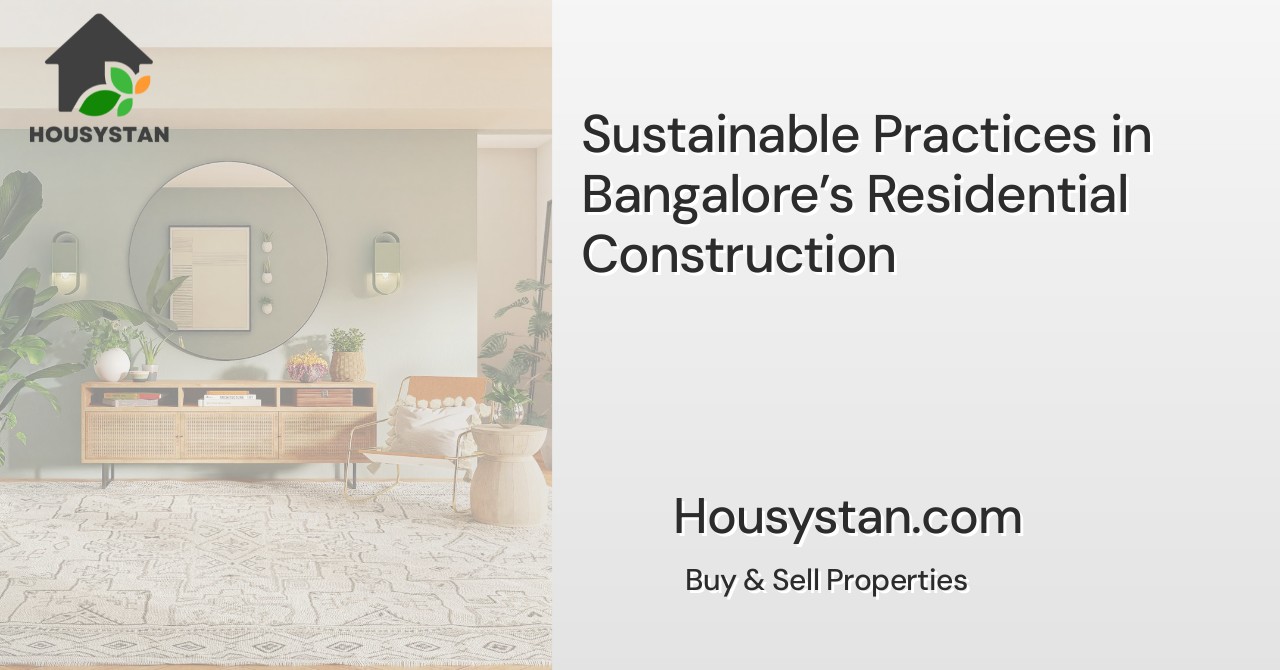Sustainable Practices in Bangalore’s Residential Construction
Read latest blogs and articles from Housystan

The Information mentioned here was last updated on:
21/2/2026Sustainable Practices in Bangalore’s Residential Construction
The Rise of Sustainable Construction in Bangalore
Bangalore, often called the Silicon Valley of India, is experiencing rapid urbanization and an ever-growing demand for residential spaces. With this unprecedented growth comes a pressing need to balance development with environmental responsibility. As a result, sustainable practices in Bangalore’s residential construction sector are no longer a niche trend but a critical necessity. Developers, architects, and homebuyers are increasingly prioritizing green building techniques, energy efficiency, and environmentally-friendly materials to create homes that are both comfortable and conscious of their ecological impact.
- Verified Tenants/Buyers
- Unlimited Property Listing
- Zero subscription/charges fee
Understanding Sustainable Construction
Sustainable construction refers to the use of processes and materials that are resource-efficient and environmentally responsible throughout a building's life cycle—from design and construction to operation, maintenance, renovation, and demolition. In Bangalore, this concept is taking root as builders face both regulatory pushes and consumer demand for eco-friendly living spaces. The adoption of sustainable practices not only minimizes negative environmental effects but also delivers long-term economic benefits to homeowners through reduced energy and water consumption.
Key Principles of Sustainable Residential Construction
1. Energy Efficiency
One of the cornerstones of sustainable construction in Bangalore is energy efficiency. Developers are investing in technologies and designs that minimize energy consumption. This includes the use of high-quality insulation, energy-efficient windows, and smart lighting systems. Solar panels have become increasingly common, harnessing Bangalore’s abundant sunlight to reduce dependence on non-renewable energy sources. By integrating these features, residential buildings can significantly lower electricity bills and reduce their carbon footprint.
2. Water Conservation
With water scarcity becoming a recurring challenge in Bangalore, residential projects are incorporating water-saving measures such as rainwater harvesting systems, low-flow fixtures, and greywater recycling. Landscapes are being designed with native plants that require minimal watering, further conserving this precious resource. These initiatives not only address immediate water shortages but also contribute to long-term sustainability in the city.
3. Use of Eco-Friendly Building Materials
Builders are now opting for locally sourced and sustainable materials like fly ash bricks, recycled steel, bamboo, and low-VOC (volatile organic compound) paints. Using such materials reduces transportation emissions and lowers the overall environmental impact of construction. Additionally, these materials often offer superior durability and thermal performance, enhancing the comfort and longevity of homes in Bangalore’s varied climate.
4. Waste Reduction and Management
Construction and demolition waste is a significant contributor to urban pollution. Bangalore’s sustainable residential projects focus on reducing, reusing, and recycling construction debris. By planning meticulously and adopting modular construction techniques, builders can minimize waste generation. Many developers also partner with recycling facilities to ensure that materials like concrete, wood, and metal are diverted from landfills and given a new lease on life.
The Role of Green Certifications and Regulations
Government policies and third-party certifications play a pivotal role in promoting sustainability. In Bangalore, compliance with the Indian Green Building Council (IGBC) or GRIHA (Green Rating for Integrated Habitat Assessment) has become a mark of credibility for residential projects. These certifications set benchmarks for energy, water, and resource efficiency, encouraging builders to adopt innovative solutions. Local authorities are also incentivizing green construction through fast-track approvals and tax benefits, making sustainability an attractive proposition for developers.
Smart Design for Sustainable Living
Sustainable residential construction in Bangalore goes beyond materials and technologies; it starts with intelligent design. Architects are adopting passive design principles—such as orienting buildings to maximize natural light and ventilation, and using shading devices to reduce heat gain. These strategies not only improve indoor comfort but also cut down on the need for artificial cooling and lighting. Open layouts, green roofs, and vertical gardens are becoming popular features, enhancing both aesthetic appeal and environmental performance.
Community Engagement and Awareness
Achieving sustainability in residential construction is a collaborative effort. Builders, residents, and the local government must work together to foster a culture of environmental responsibility. Many residential communities in Bangalore are leading by example, organizing workshops on waste segregation, composting, and energy conservation. These initiatives empower residents to make informed choices and create a ripple effect across neighborhoods, inspiring more people to embrace sustainable living.
Challenges and Opportunities Ahead
While progress has been made, sustainable construction in Bangalore still faces challenges. High initial costs, limited awareness, and the availability of eco-friendly materials can be significant hurdles. However, as technology advances and market demand grows, these barriers are gradually being overcome. The city’s thriving tech industry is also contributing innovative solutions, from smart home automation to efficient waste management systems, making sustainable living more accessible than ever before.
Future Trends in Sustainable Residential Construction
Looking ahead, Bangalore’s construction landscape is poised for exciting developments. The integration of digital technologies such as Building Information Modeling (BIM) and Internet of Things (IoT) is streamlining project management and enhancing building performance. The rise of prefabricated and modular construction methods is also reducing waste and accelerating project timelines. As climate change concerns intensify, demand for climate-resilient homes—with features like flood-proof basements and heat-reflective roofs—is set to increase.
Conclusion: Building a Greener Bangalore, One Home at a Time
Sustainable practices in Bangalore’s residential construction sector are transforming the way the city grows. By prioritizing energy efficiency, water conservation, and eco-friendly materials, the industry is not just responding to market trends but fulfilling a social responsibility. With continued innovation, supportive policies, and active community participation, Bangalore can set a benchmark for sustainable urban living in India. For homebuyers, investing in a green home means embracing a lifestyle that values comfort, health, and the planet—ensuring a brighter, greener future for generations to come.